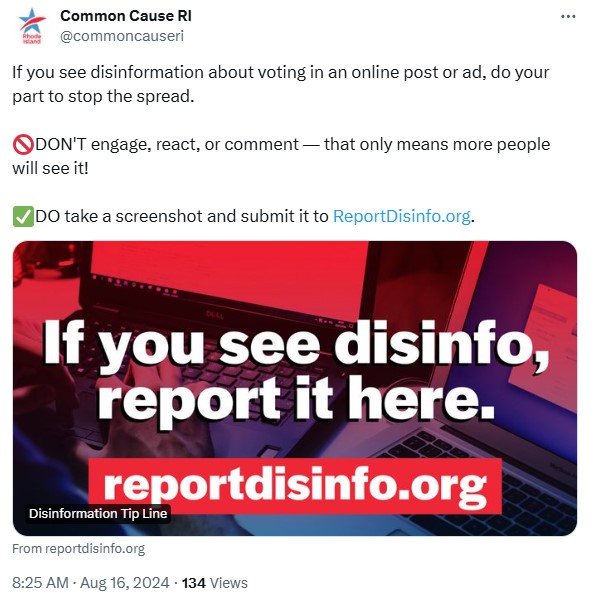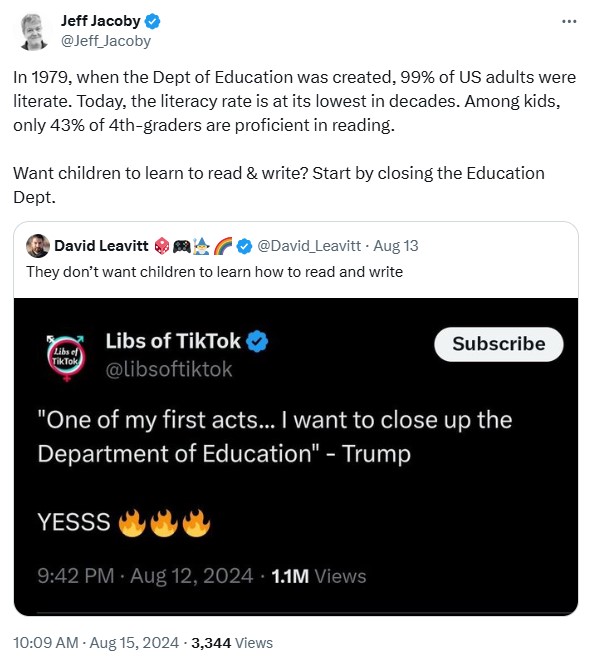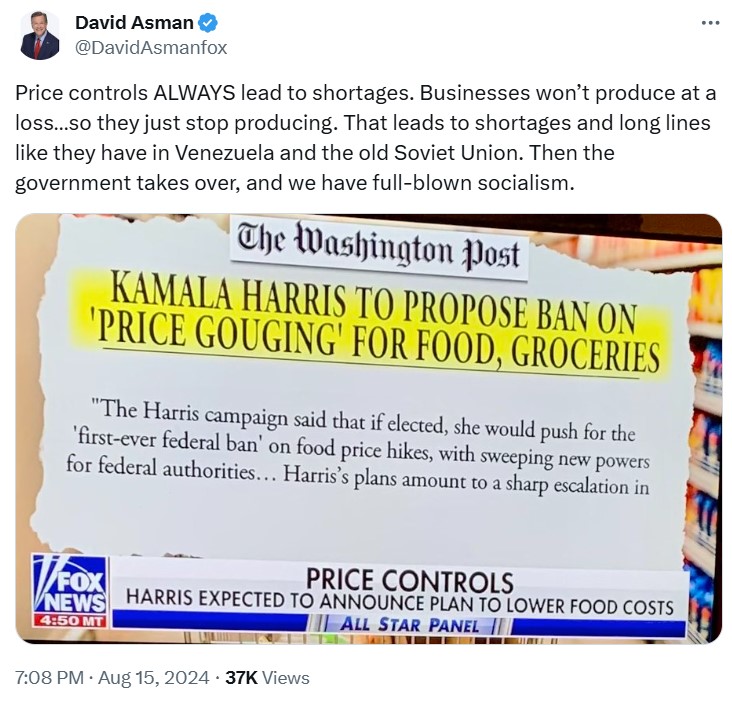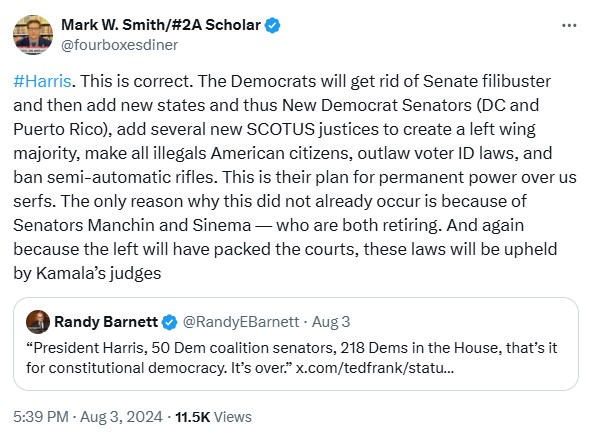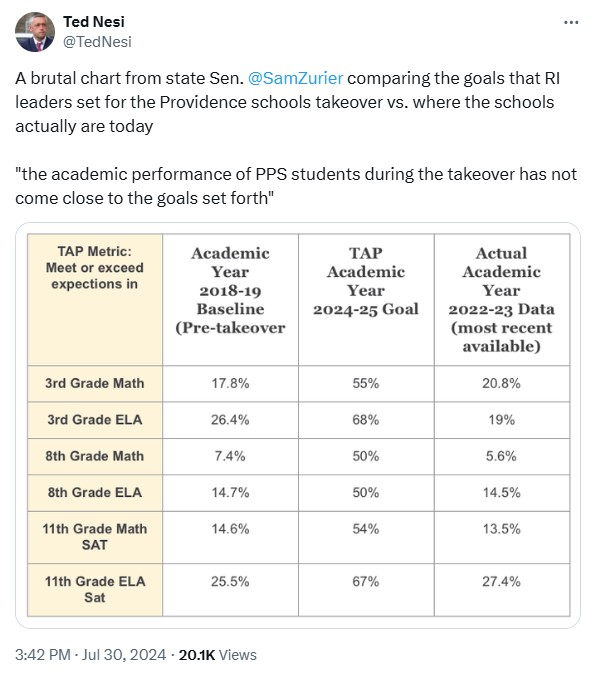… by the discomfiting fascist, Orwellian tone of this campaign from supposed good-government-group Common Cause RI:
It’s bad enough on its face, but it’s worse when you break down the manipulative message. First, Common Cause wants you to believe that you can instantly identify “disinformation about voting.” Next, the organization asserts that you have a responsibility to act against it. The first step in doing so is to help censor it by failing to “engage, react, or comment.” Instead, you’re to run to the nearest authority — Common Cause — in order to file a report.
And who are these authorities? That’s the curious part. Common Cause RI has been a leading force in our state creating regulatory barriers to civic engagement, with the excuse of providing voters with information about who’s supporting candidates and causes. Yet, the ReportDisinfo About page is laughably sparse. There’s a box on the bottom that looks like a button, saying “Paid for by Common Cause Education Fund,” but it’s not a button. You’d have to investigate even that.
There’s little doubt in my mind that Common Cause RI will be onboard someday when progressives start rounding people up for wrongthink.
[Open full post]Although it feels as if genuine policy debates have receded into the background in Rhode Island, reviving them may help correct the corrosion spreading throughout our civic house. Corporate tax incentives, for example, are an area in which conservatives and progressives in Rhode Island tend to agree on the binary “yes/no” question, raising the possibility not only of collaboration, but also of changed minds. If we agree on the conclusion, perhaps interaction will give us the farther-reaching chance to be persuasive about our reasoning, which is where the difference comes in.
Put in context, the problem with government’s corporate incentives is not that private-sector greed corrupts the pure intent of government officials, but that they allow the corrupt impulses of all people to work around natural social forces while failing to accomplish their stated goals. Rather than fix an unhealthy regulatory environment, for example, the relevant government offers to compensate its chosen businesses for the regulations’ cost while imposing new requirements that have nothing to do with the economic reality of the area (such as employment targets, products offered, and store hours).
John Mozena explains the problem succinctly, with examples, for the Iowans for Tax Relief Foundation:
The Hy-Vee saga demonstrates one of the biggest flaws with the way government-run “economic development” programs function in Iowa and across the country: Elected officials and bureaucrats always have big plans, but the marketplace often has different ideas. These taxpayer-funded subsidies are meant to cover over the gap and create incentive for businesses to locate in one place instead of another.
The problem is that subsidies have become so common — and are so valuable as a political tool for politicians wanting to claim they “created jobs” for their constituents — that not getting money from taxpayers is now far more unusual for a project of any meaningful size than receiving it. As expensive as they are, however, the real-world evidence is that these subsidies aren’t big enough to change companies’ decisions about where to go, what to build, and how many people to employ.
Mozena cites a study from Iowa academics finding that these incentives are a waste of money 90% of the time.
Unfortunately, they’re so darned attractive to government officials, at least as long as taxpayers are apathetic, bought-off, or confused by the tangle of issues on which they’re supposed to base their votes. Officials get to pretend that they can use other people’s money to wish away economics and human nature. Their urge to control gets another boost when they find themselves empowered to pick and choose the beneficiaries of that largesse, which they can dispense based on their own pretense to entrepreneurial insight, organizations’ alignment with their ideology, or the tendency of the company’s officials to put money in their campaign coffers. And finally, rather than private sector businesses’ being a competing source of power and influence in the local community, they become dependent on government for subsidies.
In theory, in studies, and in common sense, corporate subsidies can be seen to be worse than useless. After agreeing on that proposition, however, progressives and conservatives part ways, with the former seeing it as a reason for putting more resources under total government control. Conservatives, in contrast, see it more like mold in the basement; you can clean it up and dress up the damaged areas, but the wiser course would be to understand it as a symptom that points to a deeper problem to resolve.
Featured image by Justin Katz using Dall-E 40.
[Open full post]Boston Globe columnist Jeff Jacoby offers a startling statistic:
Blaming the Department of Education isn’t only a matter of post hoc ergo propter hoc, and I’d say the unionization of teachers played an equal or greater role in destroying American education. To be sure, both developments echo a similar underlying problem in the same direction: They move education farther from families’ ability to force accountability for failure on the system. The Department of Education facilitates top-down policy from far-away D.C., in part by empowering academic experimenters, while teachers’ unions transform the workforce on the scene into an unaccountable jobs program.
But again: People don’t have to agree with my conclusions for us to agree that we ought to be debating this problem more.
[Open full post]I mean the title of this post in the sense both that progressivism/socialism ignores human nature and that it pretends people aren’t human. Consider:
The underlying assumption appears to be that producers will simply produce because they are producers. Human beings don’t fall into nice progressive categories. We make decisions and change our status, and it can be in directions that produce better outcomes for everybody or that don’t.
[Open full post]On WNRI 1380 AM/95.1 FM, John DePetro and Justin Katz discuss:
- A union thug embarrasses pro-wind labor
- State workers’ accountability to nobody for the Washington Bridge
- Nobody explains why anybody should run the Providence School District
- A far-left Republican demands her opposition stop exposing her record
- The media backs the establishment… as usual
Featured image by Justin Katz using Dall-E 40.
[Open full post]I may revise my opinion if conflicting results come in, but for now, I’m choosing to believe that this is 100% on the money:
Among 6,001 Health and Retirement Study participants in the U.S., drinking two or more cups of coffee a day was associated with a 28% lower risk of dementia over 7 years compared with drinking less than one daily cup (P<0.05), reported Changzheng Yuan, ScD, of the Harvard T.H. Chan School of Public Health in Boston and the Zhejiang University School of Medicine in China, in a poster presented at the meeting. …
When total caffeine intake derived from coffee and tea was calculated, participants in the highest quartile of caffeine consumption had a 38% decreased risk of dementia (P=0.032), Yuan and co-authors said.
At the very least, people should have learned by now to be cautious about accepting or rejecting proclamations about what is or isn’t good for us, with especial wariness when the instruction is to stop doing something you like.
Generally, I’ve found that “believers in science” don’t seem to appreciate the complex ways in which our bodies were conditioned through evolution to interact in complex, overall beneficial, ways with substances we enjoy.
[Open full post]Whether you think Mark Smith’s reasoning here is dead-on, insane, or somewhere in between, an element is important to consider:
Namely, he’s not just stating dislike and projecting an action, á la “Trump will end democracy.” He’s offering actual policy steps by which Democrats could achieve that end.
The same can’t be done in reverse because Donald Trump will be opposed by the entire governing and media establishment, whereas the same powers will support the Democrats, as we’re seeing in the efforts to place Harris in office.
[Open full post]The past week has brought us a startling display of dishonesty from the Democrat Party. Politicians with multiple mansions talked about not letting people take more than they need. The Party’s stated policies, not to mention its level of respect for people who are not its supporters, are nearly inverted from what they’ve actually done while in power. They’ve created the fictitious belief that hordes of Republicans mocked Tim Walz’s son and spread false rumors about a surprise celebrity guest to keep people watching through Harris’s speech o’ lies.
Fortuitously, this item reached the top of my to-post list this morning:
As you may recall, Hutchinson said that on January 6, as President Donald Trump was driven from his speech at a Save America rally to the White House, he “lunged” at the Secret Service driver when he learned that he wouldn’t be going to the Capitol Building for a “peaceful and patriotic” protest. That was the story she told the January 6 Committee.
Hutchinson, immediately turned into the darling of the Never Trump left. She testified before the January 6 Committee — which, coincidentally, put their documents into the wood-chipper too, small world — that the angry orange man caused quite a scene in the car. …
Hutchinson’s “source” for the gossip was, she claimed, former Secret Service agent-turned-Trump White House Deputy Chief of Staff Tony Ornato. Ornato says he never witnessed the event, much less told her.
Furthermore, the IG’s redacted report says the Secret Service took more than four months before he made himself available where he reiterated that this Trump episode never happened. The other Secret Service agents who were in the car said Trump never lunged at the driver, though one reported that he was angry that he couldn’t go.
So much of what people think is real has entered their minds in this way. Through lies and innuendo, Democrats created the impression of Donald Trump orchestrating a coup. That’s the negative version of the massive propaganda push to recast Kamala Harris in a positive light. If you’ve reached my level of suspicion, you’ll observe that the former gives them cover for by-any-means-necessary legal attacks, assassination attempts, and fraud, while the latter gives them plausible deniability for these things when they win… sorry, “win.”
Here’s how things look to me: The Party knew that, in the absence of COVID, they couldn’t repeat Biden’s small-audience non-campaign of 2020, so once they’d forced Joe out because they couldn’t keep him under control and he couldn’t perform even minimally, they staged a series of identity-group online events as a pretense for campaign donation laundering, used those resources to generate a spectacle of a convention and fund a massive deception campaign, and are keeping their candidate away from extemporaneous interviews. With perfected mail-ballot fraud and votes from illegal immigrants, they’ll likely avoid the much-too-conspicuous middle-of-the-night results switch that got them over the line in 2020.
Featured image Giovanni Bellini Four Allegories: Falsehood, downloaded from WikiArt.
[Open full post]Further to yesterday’s post on Johnston politics, don’t forget this corresponding news about the state legislature:
In 2022, just 20 percent of Rhode Island’s 113 General Assembly seats went uncontested in a primary and/or the general election.
But this year, 52 percent of those Assembly seats will go uncontested thanks to a sharp drop in Democratic primaries and Republican candidates.
That combination — of plunging numbers of progressive challengers in September and a truncated GOP field in November — will benefit incumbents, but leave Rhode Island voters with far fewer choices as they head to the polls this fall, observers say.
COVID and mail ballots were the end. You’ve been able to practically feel it in the air ever since. Until something fundamental shifts, it’s all over. The Party is in total control.
The article has some perfunctory hand-wringing from John Marion, whose organization, Common Cause, has been right in the mix for causing the current condition, but the fact that Boston Globe journalist Edward Fitzpatrick still goes to him to set the tone of the article shows how performative the concern is. The truth can be found in this from AFL-CIO poohbah Patrick Crowley, who came up as one of the most aggressive and offensive activists in the state and who once told the progressive NetRoots Nation conference when it came to Providence that the radical Left in the Ocean State was implementing a “one union” strategy to fuse progressivism with labor unions to take over the state: “Generally, the General Assembly has performed exactly as Rhode Islanders are expecting them to.”
Just as union organizers always mean “union members” when they say “workers,” when Crowley says “Rhode Islanders,” he means is particular far-left faction. They’ve completely bought state government, and neither journalists or supposed good-government groups are interested in causing them any problems.
[Open full post]I mean, look at this:
The scores were abysmal to start; the goals were obviously fictitious when considered in the absence of a practical plan; and the final results are offensively bad. If these results aren’t causing outrage, it’s because nobody in the Democrat establishment or news media wants to address the underlying problems, which are entangled with labor union privilege and political power.
[Open full post]


